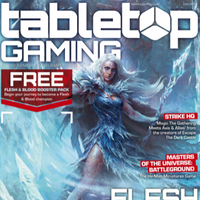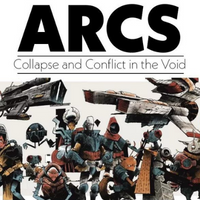29 March 2023
|
Are you bidding to find an auction game that everyone might like? Look no further than Ancient Egypt
Words by Chris Marling
As a board game mechanism, bidding sits firmly in the Marmite category. Any game with an auction becomes immediately divisive for many groups, with some players simply refusing to play them. So, it is possible for these opposites to reach their hands across the divide and find a common game?
Let me – or rather designer Reina Knizia – transport you back a few thousand years to Ancient Egypt. Picture yourself as a major political player trying to expand your fame and influence. Over three epochs you’ll influence powerful Pharaohs, build incredible monuments, collect gold and take advantage of the Nile’s bounty while advancing the knowledge of your civilization. All while avoiding disasters such as droughts, earthquakes and civil unrest.
But most importantly of all, you’ll curry favour with the gods. The likes of Anubis, Seth and Horus can help you tactically outmanoeuvre your opponents. But invoking the mighty Ra at exactly the right times will lead one player to the ultimate victory.
WHAT IS IT?
Ultimately, this is an auctions game. But the way it limits bidding is where Ra finds its crossover appeal. Over three rounds, players slowly collect a variety of tiles. Each type of tile will score in different ways – some having one-time abilities, others scoring once before being discarded, and others continuing to be useful throughout the game.
Player turns are very fast, making it scale nicely right up from two to five players – although it’s generally considered best at three or four. On your turn, you decide to either add a random tile (from a bag) to the current offer – or start an auction (by theatrically shouting, “Ra!” – well, you do if you’re in our group…) for what is already available. This decision is sometimes simple, but often more nuanced.
First, you need to consider each player’s current bidding potential. Depending on the number of players, you’ll each start with three or four sun (read: bidding) tokens. Once an auction begins, each player can bid one of their tokens in a once-around the table auction which ends with the player that called it. So as a rule, if you have weak tokens, you don’t want the offer to get too tasty – as you’ll be unlikely to win it. If you end up with eight tiles in the offer, an auction will be automatically triggered.
Second, you need to analyse the actual tiles that are available. Who needs what, and how badly? All of this is open information, and the tiles are bright and colourful, so it’s easy to see all the information you need. Even if there are only a couple of tokens – even one – in the offer, does someone want it badly enough to use a token to take just a small reward? Or does the presence of a particular negative tile (which usually destroy a few tiles you’ve already taken) rule some people out of this next auction already?
Finally, weighing up how far through the round – and game – you are, can be crucially important. A round can end after all players have used all their bidding tokens (once out of tokens, you sit out the rest of the round). Or if a certain number of Ra tiles have been drawn from the bag, depending on player count. This adds a fantastic push-your-luck element to the game, especially if you’re the only player left with bid tokens and there’s only one or two Ra tiles left before the round ends. How far are you willing to risk it? Because if that last Ra tile pops up, the round ends automatically and you get nothing.
When you do win an auction, you must take all the tiles that were in the offer. You also put your winning bid token onto the tile board and take the one left by the player
who won the previous auction. In this way, each player gets a new set of tokens to bid with next round – or score if the game is about to end. All the bidding tokens are unique (numbered 1-16), and a good set can make all the difference. In a round where Ra tokens are coming out fast, shortening the round immensely, it’s not unusual to see a player call an auction simply for a strong bid token – before any tiles have even been drawn from the bag.
WHY SHOULD YOU PLAY IT?
Ra is a push-your-luck set collection game, where the timing of the acquisition of tiles is decided by the players. When you have a chance to buy, you get one shot at making an offer for what’s available – and you do so with the full knowledge of what the other players have in terms of bidding power and desire. It just doesn’t really feel like a traditional auction game. It’s as much about deduction and reading the table as it is about anything else. Put simply, it’s competitive and interactive fun in the ways a traditional family game should be.
You won’t find many games published as early as this (1999) in the Board Game Geek Top 200 games of all time, but Ra is hanging in there. And it also ranks in the top 150 strategy games, while probably being the highest ranked pure auction game on the list. And Reina Knizia’s reputation speaks for itself, with him generally considered to be one of the best game designers of all time.
Holding on to this level of reputation in a business constantly screaming for the new shiny cannot be overlooked. It only takes an hour to play, is quick to set up, looks lovely on the table, and gamer kids as young as ten won’t have any issues learning it. And who doesn’t want to stand up and shout “Ra!” while banging a chunky wooden god statue on the table?
Looking for more?

This review came from Tabletop Gaming Magazine, which is home to all of the latest and greatest tabletop goodness. Whether you're a board gamer, card gamer, wargamer, RPG player or all of the above, find your copy here.
Get your magazine hereRead More...

If you want to read more about one of the most hotly anticipated games of the year, check out our interview with Cole Wehrle on ARCS! A new game from the designer of Root and Oath, and we've got all you need to know.
To infinity and beyond
Sometimes we may include links to online retailers, from which we might receive a commission if you make a purchase. Affiliate links do not influence editorial coverage and will only be used when covering relevant products







